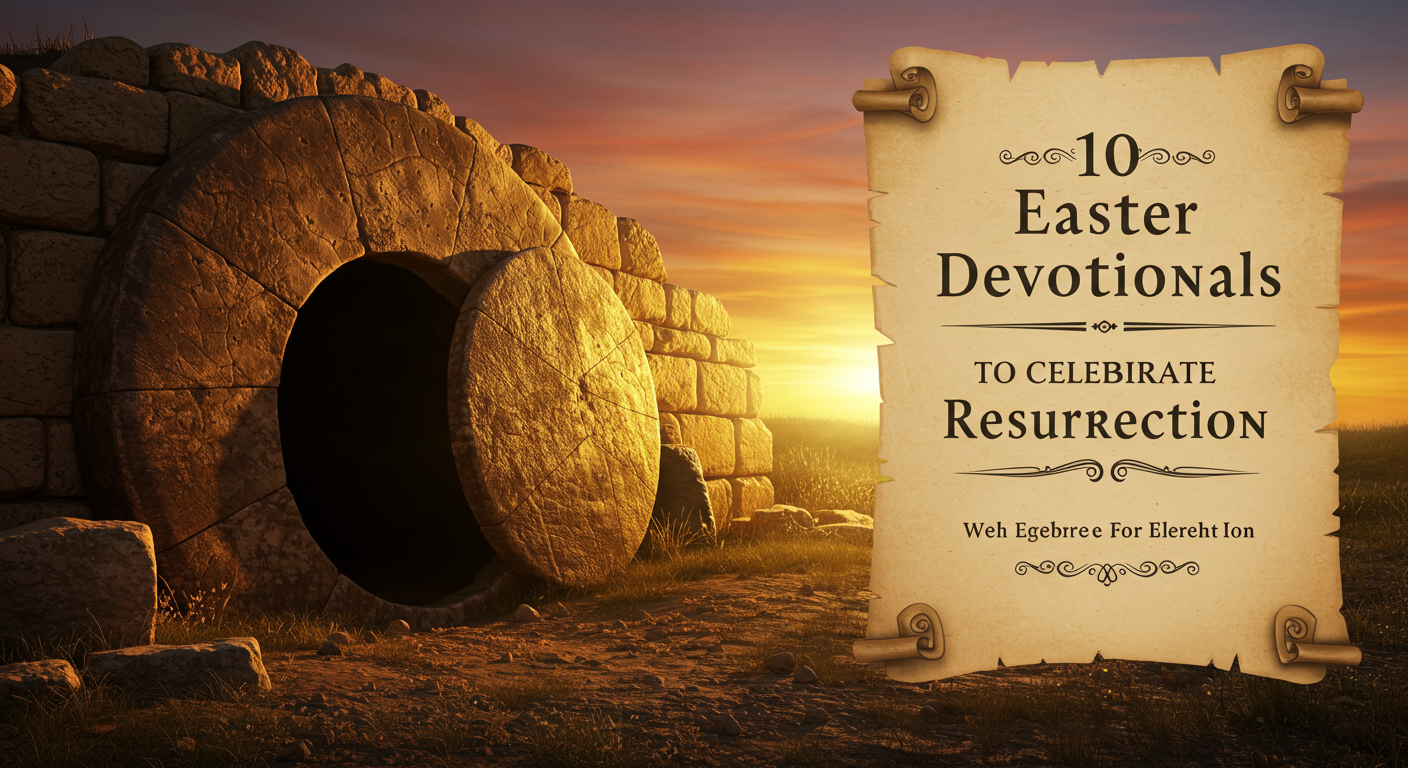10 Easter Devotionals To Celebrate The Resurrection
Easter is the heartbeat of the Christian faith. It’s the moment hope broke through history and changed everything. As you prepare your heart for Resurrection Sunday, these ten devotionals are designed to walk you through Scripture, reflection, prayer, and practical application so you can experience the power of the risen Christ in your daily life. Each short devotional centers on a biblical truth and includes a Scripture link for deeper reading. If you’re leading a small group, sharing with a friend, or looking for a personal rhythm of devotion, these readings will help you focus on what matters most: Jesus alive.
If you want to make this season meaningful, choose one devotional a day during Holy Week, or spread them across the entire Easter season. This Easter Devotional collection is crafted to be shareable, prayerful, and transformational—ready to post in a group chat, read with family, or use as a moment of quiet before your church service. You’ll find Scripture references linked to Bible Gateway so you can read the context and meditate on the passage for yourself.
As you move through each devotional, let the resurrection inform your identity, your hope, and your mission. Read the verse, reflect on the short devotional, answer the brief question or two that follows, and close with the suggested prayer. Your experience of Easter will grow deeper when you practice these small, spiritual habits. Now let’s begin with the first devotion: the empty tomb and the miracle of hope.
1. The Empty Tomb: Hope That Changes Everything
The discovery of the empty tomb is the pivot point of history. When Mary Magdalene and the other women arrived and found the stone rolled away, their grief was met with the promise that death had been defeated. You need that hope today—no circumstance is too dark for the light of the Resurrection. Read Luke 24:5-7 and let the words wash over you: they remind you that Jesus predicted his suffering and rising, and that nothing can overturn God’s plan of redemption. Luke 24:5-7
As you reflect, remember that hope isn’t wishful thinking; it’s rooted in the historical reality that Jesus rose. This changes how you face loss, fear, and uncertainty. When you encounter an empty place in your life—like an empty future, an empty promise, or an empty heart—allow the truth of the empty tomb to speak courage into that space. Practically, this might mean you choose to pray first instead of panic, to forgive rather than festering, and to step forward in faith even when you don’t see the whole path. Ask yourself: where do I need the hope of the empty tomb to break through today?
Prayer: Lord, meet me at the empty places in my life. Help me to trust your resurrection power, and give me courage to step into the new things you are doing. Amen.
2. He Is Risen: The Power Over Death
When Jesus said, “I am the resurrection and the life,” he offered a personal, living promise. That’s not a philosophical statement; it’s relational. Jesus invites you to know him as the source of your new life. Meditate on John 11:25-26 and let it become personal: Jesus speaks not only about coming events, but about your present reality—life, even in the middle of loss. John 11:25-26
The Resurrection guarantees that death does not have the last word. That truth brings comfort in grief, and it fuels your witness. When you begin to live from the perspective of eternal life, your priorities change. You worry less about temporary setbacks and more about living generously and faithfully. How would your daily choices change if you truly believed Jesus’ promise that life is found in him? Take a moment to write one practical step you can take this week to live in light of that reality—perhaps a courageous conversation, a sacrificial gift, or a commitment to pray daily.
Prayer: Jesus, be my life. Teach me to live from the reality of your resurrection so my days reflect your presence and my choices point others to you. Amen.
3. Raised With Christ: A New Identity
The resurrection doesn’t just change what you believe; it changes who you are. By faith, you are united with Christ in his death and resurrection. Romans 6:4 tells you that you were buried with him through baptism into death so that, just as Christ was raised from the dead, you too may live a new life. Romans 6:4
This new identity affects how you view your past, your present struggles, and your future. You’re not defined by your failures or your shame; you’re defined by the risen King who calls you beloved. Let that truth reshape your language about yourself—replace “I’m a failure” with “I’m forgiven,” “I’m stuck” with “I’m becoming.” Practically, living as someone raised with Christ might mean you take tangible steps to align your life with what God has called you to—quit an ungodly habit, reconcile a broken relationship, or begin serving in your local church. Consider what a resurrection-shaped identity asks you to leave behind.
Prayer: Thank you, Father, that I am raised with Christ. Help me live in a way that reflects this new identity and honors your transformative work in me. Amen.
4. The Victory of Grace: Forgiven and Free
One of the sweetest fruits of the Resurrection is the gift of grace. Jesus’ rising confirms that God’s plan of redemption satisfies divine justice and offers you forgiveness freely. 1 Peter 1:3 reminds you that God has given you new birth into a living hope through Jesus’ resurrection—this is grace, and it’s available to you now. 1 Peter 1:3
Grace changes everything about how you relate to yourself and to others. Instead of living performance-driven lives, you can live from gratitude. Rather than measuring your worth by accomplishments, you’re measured by Christ’s finished work. When you accept grace, you become both humbled and empowered—humbled because you didn’t earn it, empowered because it frees you to serve. Practically, let grace reshape how you approach relationships. Offer forgiveness first; give grace generously; confess quickly. The Resurrection legitimizes mercy as the highest ethic in your life.
Prayer: Lord, thank you for the victory of your grace. Teach me to live out that grace daily—receiving it with humility and extending it with boldness. Amen.
5. Hope in Suffering: The Resurrection’s Comfort
Suffering is real, and Easter doesn’t pretend otherwise. What the Resurrection does is reframe suffering: it promises that pain is not final. Acts 2:24 declares that God raised Jesus to life, freeing him from the agony of death, because he could not be held in its power. Acts 2:24
When you’re in the midst of trials—illness, grief, financial strain—the Resurrection offers assurance that suffering is temporary and purposeful in God’s hands. This changes how you respond: instead of bitterness, you can cultivate endurance; instead of despair, you can cling to hope. Practical application means anchoring your sorrow in Scripture and community. Share your burden with trusted friends and let the church pray with you. Journal your prayers and the ways God answers them; this builds faith for the next storm. Ask yourself: how can the reality of the resurrection bring comfort to a current pain?
Prayer: Father, in my suffering, remind me of the resurrection. Give patience today, hope for tomorrow, and the courage to trust you now. Amen.

6. New Life in Practice: Walking in Resurrection Power
Believing in the Resurrection isn’t a one-time decision; it’s a daily walk. Colossians 3:1 instructs you to seek the things above where Christ is seated, and to set your mind on heavenly realities. Colossians 3:1
To walk in resurrection power means you make spiritual choices that reflect eternal realities. You prioritize prayer, Scripture, worship, and service because those habits keep your focus upward. It also means you practice spiritual disciplines that help you die to old patterns and rise to new ones—fasting from distractions, serving the marginalized, and confessing sin quickly. This practical holiness leads to personal transformation, and your transformed life becomes a witness to others. What one spiritual discipline will you start or renew this week to keep your heart tuned to the resurrection?
Prayer: Lord, empower me to walk in resurrection power. Give me discipline to pursue what is above and courage to let go of what holds me back. Amen.
7. The Resurrection and Mission: Go Tell the World
The Resurrection is not just for your comfort; it’s your marching orders. The early disciples went from frightened to bold after they encountered the risen Jesus. Matthew 28:5-7 contains the angel’s command to the women: “Go quickly and tell his disciples.” The message they carried changed the world, and that same message is entrusted to you. Matthew 28:5-7
Your faith is meant to be shared in both word and deed. The evidence of resurrection life in you will be seen by your love, your service, and your courage to speak the truth in kindness. Mission doesn’t require a pulpit or a seminary degree; it requires a willing heart. Start small: invite a neighbor to church, share your testimony on social media, or volunteer where needs are urgent. As you obey, you’ll find that the Resurrection fuels your witness—people notice when hope is alive in you. How can you take one step this week to share the good news of Jesus’ resurrection?
Prayer: Jesus, send me. Fill me with boldness to tell others about your rising and to live a life that points to your saving power. Amen.
8. Resurrection and Repentance: Turning Toward God
The empty tomb calls for a response of repentance—not because God is bitter, but because new life requires a change of direction. Mark 1:15 records Jesus’ call to repent and believe the good news. The Resurrection validates that call; you turn from dead ways and toward the living Savior. Mark 1:15
Repentance is both immediate and ongoing. It’s immediate when you confess sin and receive forgiveness; it’s ongoing as you continually align your life with Christ. This posture keeps you humble and dependent on God’s grace. Practically, repentance might look like regular confession, accountability relationships, or making amends where you’ve harmed others. It is never merely guilt-driven; it is life-giving because it removes barriers between you and God. Take some time today to ask God to reveal one area where you need to turn toward him, and commit to one practical step of repentance.
Prayer: Lord, give me the courage to repent and the humility to change. Let my life reflect the new direction your resurrection has set before me. Amen.
9. Resurrection and Community: Share in New Life Together
The Resurrection was experienced in community. The disciples encountered the risen Christ together, and the early church practiced shared life marked by prayer and generosity. Acts 4:33 celebrates how the apostles testified to the resurrection with great power, and the community experienced grace together. Acts 4:33
You are not meant to do faith alone. Resurrection life grows in the soil of community—where you confess, forgive, serve, and encourage. If you feel isolated, Easter is your invitation back into fellowship. Join a small group, serve with others, or start a prayer circle. Community helps you hold fast to the truth when doubts come and gives you opportunities to practice love. Evaluate your relationships and ask: Who will help you live the resurrection life more faithfully? Reach out today to one person and invite them into a life of shared discipleship.
Prayer: Father, surround me with a community that reflects the truth of the resurrection. Help me to be a faithful friend and a loving part of your family. Amen.
10. Living With Eternal Perspective: The Resurrection’s Last Word
Finally, the Resurrection calls you to live with an eternal perspective. 1 Corinthians 15 is Paul’s great sermon on resurrection, culminating in the promise that death will be swallowed up in victory. Reading this chapter helps you see your life as part of God’s grand story—a story that ends in restoration and rejoicing. 1 Corinthians 15:54-55
An eternal perspective reshapes priorities, attachments, and anxieties. You begin to invest in what lasts: souls, character, and the Kingdom of God. This doesn’t mean the present life is meaningless; it means you live it intentionally, knowing that God redeems even your mundane efforts. As you practice this, you trade short-term gratifications for lasting impact. What legacy do you want to leave? Make a simple plan this week to invest in something eternal—teach a child, mentor someone, give to advance the Gospel, or commit to prayer for the nations.
Prayer: Eternal God, help me see life through your perspective. Let the hope of resurrection guide my choices and inspire me to live with purpose every day. Amen.

Conclusion: Celebrate, Share, and Live the Resurrection
Easter isn’t a single day—it’s a way of life. These ten devotionals are a starting point to help you celebrate the Resurrection now and every day after. As you let these Scripture readings and reflections sink in, you’ll notice changes: deeper hope in suffering, a bolder witness, a stronger sense of identity, and a life increasingly aligned with God’s purposes. If you begin with one devotional each morning, by the time Easter arrives, you’ll be ready to worship with a heart that’s been prepared and a life that reflects the risen Lord.
If one of these devotionals has spoken to you, share it with a friend. Invite someone into the journey. The Resurrection is a message that grows when it’s passed on. Thank you for reading—if this post encouraged you, please clap, leave a comment to share how it helped you, and subscribe to my Medium newsletter for more weekly reflections and devotional resources that will strengthen your walk with Christ.
Prayer to close: Risen Lord, thank you for your life, your death, and your resurrection. Help me to live in the power of your rising and to share that hope wherever I go. Amen.


